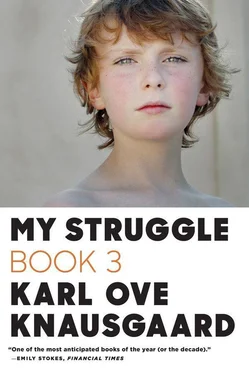“Did you see that?” I said. “It was a Mercedes!”
I wasn’t interested in cars, boats, or motorbikes, I knew nothing about them, but as all the others did, I had to make an effort now and then, just to show that I too was clued in.
“No, it wasn’t,” Geir Håkon said. “Mercedes doesn’t make trucks.”
“Didn’t you see the star then?” I said.
“Are you blind or what? That was not a Mercedes star,” he said.
“Yes, it was,” I said.
Geir Håkon snorted. For a moment his puffy cheeks were even fatter than usual.
“Anyway, Mercedes does make trucks. I’ve read about it in a book I have.”
“I’d like to see that book,” Geir Håkon said. “You’re lying through your teeth. You know nothing about trucks.”
“And I suppose you do, just because your Dad works on construction machines?” I said.
“Yes, as a matter of fact I do,” he said.
“Oooh,” I said sarcastically. “You think you know all about slalom skis, too, just because your Dad has bought you a pair. But you can’t slalom. You’re useless at skiing. So what are you doing with all that gear? If you can’t use it. Everyone says you’re spoiled. And you are. You get everything you point a finger at.”
“I do not,” he said. “You’re just jealous.”
“Why would I be jealous of you?” I said.
“Give it a rest, Karl Ove,” Kent Arne said.
Geir Håkon had not only averted his face now but his whole body.
“Why should I give it a rest, and not Geir Håkon?” I said.
“Because Geir Håkon’s right,” Kent Arne said. “It wasn’t a Mercedes. And he’s not the only person who has slalom skis. I’ve got some, too.”
“That’s just because your Dad’s dead,” I said. “That’s why your mother buys you all sorts of things.”
“That’s not why,” Kent Arne said. “It’s because she wants me to have them. And we can afford it.”
“But your mother works in a shop,” I said. “You don’t exactly earn a lot of money there.”
“Is being a teacher any better?” Leif Tore said, who wanted to put in his two cents now. “Don’t you think we’ve seen the wall at your place? It’s full of cracks and falling down because your father didn’t know it needed reinforcement. He only used cement! How stupid can you get?”
“And then he reckons he’s something special because he’s on the council,” Kent Arne said. “Salutes us with one finger and stuff when he drives past. So you can just shut up.”
“Why should I shut up?”
“Well, in fact, you don’t have to. You can stand here and rattle on as you usually do. We definitely don’t want to play with you.”
And then they ran off.
The disagreements never lasted long, a few hours later I was playing with them again, if I wanted, but there was something awry, I was finding myself in situations with my back against the wall more and more often, the others were moving away more and more often when I approached, even Geir, in fact, on occasion I realized they were actually hiding from me. On the estate when anyone said something about someone it was immediately repeated by others, and then it suddenly became something everyone said. About me it was said that I always knew best and I was always boasting. But I did know best, I knew much more than the others, so why should I pretend anything else? If I knew something, it was because that was how it was. And as far as boasting was concerned, everyone boasted, all the time. Dag Lothar, for example, whom everyone liked, didn’t he start every other sentence with “I don’t mean to brag but …” and go on to tell us about something good he had done or something good someone had said about him?
Yes, he did. So this wasn’t about what I did but about the person I was. Why otherwise would Rolf call me “Mr. Pro” when we played soccer in the road? I hadn’t done anything special, had I? You think you’re so good at soccer, don’t you, he said, eh, Mr. Pro? But all I had done was to say what was what, and why shouldn’t I if I went to a soccer camp and actually knew ? We shouldn’t run around in a pack, we had to spread out and then pass the ball or dribble, not mill around the way we did.
But I also had the last word that spring. For when the lessons at school were reorganized to make preparations for the end-of-the-year celebrations and Frøken handed out booklets of the play that we were to perform for all the parents on the biggest day of the year, namely the last, who was allocated the principal role but me?
Not Leif Tore, not Geir Håkon, not Trond, and not Geir.
But me.
Me, me, me.
None of them would be capable of learning so many lines by heart, it was something only Eivind and I, and perhaps Sverre, of the boys, could do, and the fact that Frøken chose me in the end was by no means fortuitous.
I was so happy when she told me that I didn’t know what to do with myself.
Every day of the last week we rehearsed, every day I was the center of attention in the class, Anne Lisbet’s, too, and when the final day arrived, in radiant sunshine, all the parents came as well. Dressed in their finest outfits, they sat on chairs by the wall, took photos, were hushed when we enthusiastically said our lines, and burst into applause at the end.
Then we played recorders, sang, were presented with our grade books, Frøken wished us a good summer, and we ran out into the playground and down to the waiting cars.
Grade book in hand, I stood impatiently with Geir in front of Mom’s Beetle. She strolled along with Martha, they were chatting and laughing and didn’t see Geir and me until they were a few meters away.
Mom was wearing beige trousers and a rust-red sweater with the sleeves turned up over her forearms. Her hair hung a long way down her back. On her feet she wore a pair of light-brown sandals. She had just turned thirty-two, while Martha, who was wearing a brown dress, was two years older.
They were young women, but we didn’t know that.
Mom rummaged through her bag for the car key.
“You were all so good,” Martha said.
“Thank you,” I said.
Geir said nothing, just squinted into the sun.
“Oh, here it is,” Mom said at length. She unlocked the car and we got in, adults in the front, children in the back. They both lit up cigarettes. And then we drove home in the sunshine.
That evening I stood in the doorway watching Mom drying her hair in their bedroom. Occasionally, when Dad wasn’t there, I followed her round the house and talked her ears off. Now I was quiet, the whine of the hairdryer made it impossible to speak, instead I watched her as she bent her head and lifted her hair up with a brush in one hand to the dryer in the other. She sent me sporadic glances and smiled. I went into the room. On the little table by the wall there was a letter. I didn’t mean to pry, but even at some distance I could see the first name was Sissel, Mom’s name, and that the full name was longer than Mom’s, because between Sissel and Knausgård, which I recognized rather than read, there was a third name. I went closer. “Sissel Norunn Knausgård,” it said.
Norunn?
Who was that?
“Mom!” I said.
She lowered the hairdryer, as though that would make my voice clearer, and looked at me.
“Mom,” I said again. “What does that envelope say? What kind of name is that?”
She switched off the hairdryer.
“What did you say?”
“What kind of name is that!”
I nodded toward the envelope. She leaned over and took it.
“That’s my name.”
“But it says Norunn! Your name’s not Norunn!”
“Yes, it is. It’s my middle name. Sissel Norunn.”
“Has it always been your name?”
Читать дальше












